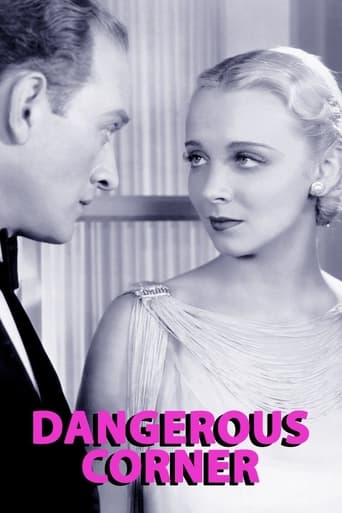



Wonderful character development!
The film makes a home in your brain and the only cure is to see it again.
View MoreGreat story, amazing characters, superb action, enthralling cinematography. Yes, this is something I am glad I spent money on.
View MoreThe film never slows down or bores, plunging from one harrowing sequence to the next.
View MoreWatch this movie from 1934 (from a 1932 English play by J.B. Priestley)to see how early the English-speaking elite began to smash up their values, with a direct path to the mayhem and anomie of the 1960s/70s, and now the politically correct straightjackets of the early 21st century. I don't give it a 10 because of the excisions made to satisfy the censors - too bad for that, as it would have made the movie even more delicious.For delicious it is, watching people throw up on their values as they wear magnificent gowns, even if we are living with the consequences now. Watch it to see what we need to recover...Priestley is of the GB Shaw school - tradition and the wisdom of our ancestors is out the window, with no one knowing at the time what great new world awaits us. Unfortunately, we know now, and owe it all to these misguided geniuses for dramatic dialogue.
View MoreDid anyone else notice that as the movie goes on and all of the characters' secrets are revealed, the character of Gordon (Betty's husband) is left with nothing to say -- and that when Betty reveals that her marriage to Gordon has been unhappy, we're not told why? That's because Hollywood left out what the original play revealed: Gordon was in love with Martin.Knowing that fact helps you understand why Betty was unhappy, and unhappy in a way that someone might hide from friends and family (particularly in that era).Leaving that plot point out doesn't ruin the movie, it just leaves Gordon standing around a lot at the end.Also, the play ends as soon as you get past the point where Gordon gets the radio going -- the secrets will not be unraveled after all, but you're left with the sense that these "happy" people have merely avoided what will eventually all come out with devastating results. It's not a happy ending.In the movie, we do get a happy ending of sorts, a marriage proposal. It changes the tone completely, and I'd say weakens the effect.
View MoreI passed by the bond theft and supposed suicide which were a spin of accusations,(secret loves are disclosed; sham marriages revealed; questions about who shot Martin fly everywhere) preferring to ponder on the character of Maude Mockeridge, famous author. (She reminded me of Joan Hickson as Miss Marple, though in a more glamorous tone).In the opening scene: Ann (a partner in a publishing business) is about to host a breakfast interview on her apartment balcony for romance author Maud Mockeridge. She carefully arranges the author's books in a flattering display. The English lady novelist has already published "A Flame", "Scarlet Flowers", "Burnt Wings" and "Paradise For Two". They discuss her new book "Ecstasy" and a possible contract.Later that morning Ann joins the publishing group and joyfully announces that she has secured a three year contact with Miss Mockeridge. Next month "Ecstasy" will be ready. Six months later "Emma The Passionate" and in one year "Sleeping Dog".The twist at the end? How it might have been followed by how it really ended no body revealed anything!
View MoreIt's amazing how different 1934 looks to us now, on the evidence of this movie. An ensemble cast of no more than eight, all with speaking parts and none of them filmed anywhere but the standard three sets. Camera angles are static and rigid, only the occasional pan out when confessions are being made and these are legion. Clearly this script could not have been filmed without the invention of cigarettes - they are central to almost every scene and crucial to the turn of the plot itself.The plot is strong and rather typical of J B Priestly in that much of the drama consists of revelations and contradictions. No-one is quite what they seem!
View More